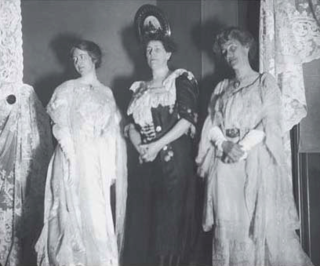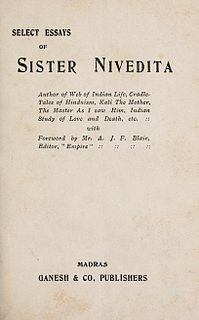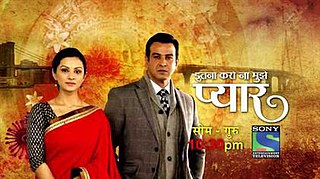
Bhārat Mata is the national personification of India as a mother goddess. She is usually depicted as a woman clad in a saffron sari holding the Indian national flag, and sometimes accompanied by a lion.

Sister Nivedita was an Irish teacher, author, social activist, school founder and disciple of Swami Vivekananda. She spent her childhood and early youth in Ireland. From her father, a college professor, she learned the ideal of service to mankind as the true service to God. She worked as a school teacher and later also opened a school. She was engaged to marry a Welsh youth, but he died soon after their engagement. Sister Nivedita met Swami Vivekananda in 1895 in London and travelled to Calcutta, India in 1898. Swami Vivekananda gave her the name Nivedita when he initiated her into the vow of Brahmacharya on 25 March 1898. In November 1898, she opened a girls' school in the Bagbazar area of Calcutta. She wanted to educate girls who were deprived of even basic education. During the plague epidemic in Calcutta in 1899, Nivedita nursed and took care of the poor patients. Nivedita had close associations with the newly established Ramakrishna Mission. Because of her active contribution in the field of Indian Nationalism, she had to publicly dissociate herself from the activities of the Ramakrishna Mission under the then president Swami Brahmananda. She was very close to Sarada Devi, the spiritual consort of Ramakrishna and one of the major influences behind Ramakrishna Mission, and also with all brother disciples of Swami Vivekananda. She died on 13 October 1911 in Darjeeling. Her epitaph reads, "Here lies Sister Nivedita who gave her all to India".

The Master as I Saw Him: Being pages of the life of the Swami Vivekananda is a 1910 book written by Sister Nivedita. The book covers Nivedita's experiences with Swami Vivekananda, whom she met in London during November 1895. The book was simultaneously published from England and India, and The Master as I Saw Him is now considered to be a classic text.

Bhagini Nivedita is a 1962 Bengali film directed by Bijoy Basu. The story was based on the life of Sister Nivedita. It won a national film award in best films category and a presidential medal.

The Web of Indian Life (1904) is a book written by Sister Nivedita. This book is a collection of essays and created a sensation when it was first published. The introduction of the book was written by Rabindranath Tagore.
Ramakrishna Sarada Mission Sister Nivedita Girls' School or Sister Nivedita Girls' School is a girls' school at Bagbazar, Kolkata. It was established by Scots-Irish social worker and disciple of Swami Vivekananda Sister Nivedita in November 1898.

Josephine MacLeod (1858–1949) was an American friend and devotee of Swami Vivekananda. She had a strong attachment to India and was an active participant in the Ramakrishna Vivekananda movement. She was given the nicknames "Tantine" and "Jo Jo" by Vivekananda. She considered Swami Vivekananda to be her friend and helped him with his finances. She and Sister Nivedita exchanged letters discussing their positive impressions of Swami Vivekananda and they competed with each other for his attention. Josephine was not a sanyasin, unlike many others such as Sister Nivedita or Sister Christine. She was instrumental in spreading Vivekananda's message on Vedanta in the West. She had many contributions to the initial and the later phases of the development of the order of Ramakrishna and Vivekananda. She was a contributor to many causes espoused by Sister Nivedita, the most famous disciple of Vivekananda, including that of contributing financially towards the development of Indian National Movement esp. in Bengal and elsewhere in India.

Cradle Tales of Hinduism (1907) is a collection of stories by Sister Nivedita. It is an introduction to Hindu mythology; the stories come from the Mahabharata, the Ramayana and other Hindu sources and are presented as they were told in Indian nurseries.

An Indian Study of Love and Death (1908) is a book written by Sister Nivedita.

Myths of the Hindus & Buddhists (1913) is a book written by Sister Nivedita and Ananda K. Coomaraswamy.

Religion and Dharma (1915) is a book written by Sister Nivedita. In this book Nivedita has discussed on the common principles of individual and social growth according to the law of Dharma.

Studies from an Eastern Home (1913) is an autobiographical book written by Sister Nivedita.

Notes of Some Wanderings with the Swami Vivekananda (1913) is an English language book written by Sister Nivedita. In this book Nivedita has narrated the experiences she had while traveling with Swami Vivekananda in different parts of India.

Select Essays of Sister Nivedita (1911) is an English-language book written by Sister Nivedita, a disciple of Swami Vivekananda. The foreword of the book was written by A. J. F. Blair.
Sankari Prasad Basu is an Indian scholar, writer and critic who writes mainly in the Bengali language. He is a researcher on Swami Vivekananda and his books on the subject include Sahashya Vivekananda and Bandhu Vivekananda. One of his notable publications is his seven-volume research work Vivekananda o Samakalin Bharatbarsha, for which he won the prestigious Sahitya Akademi Award in 1978.
Basiswar Sen was an Indian scientist and agriculturist. He was a pioneer of the Green Revolution movement that changed the food landscape of India by growing abundant food grains, thereby reducing the possibility of any famine in the country. His wife was Gertrude Emerson Sen, an American author and specialist on Asia. He founded the Vivekananda Laboratory in the Almora region of the Himalayas. He was a friend of many notable people, such as Indian Prime minister Jawaharlal Nehru, poet Rabindranath Tagore, Julian Huxley, and D. H. Lawrence. He was also associated with the Ramakrishna Order and the Ramakrishna Vivekananda movement, as well as with Jagadish Chandra Bose, the Indian scientist, and Sister Nivedita, the writer, orator, freedom fighter and direct disciple of Swami Vivekananda. The Government of India awarded him the third-highest civilian honour of Padma Bhushan in 1957.

Nivedita Menon is a feminist writer and a professor of political thought at Jawaharlal Nehru University. She previously taught at Lady Shri Ram College and the Department of Political Science at Delhi University. She is known for strong positions on several political issues, including nuclear power and the Kashmir conflict.

Itna Karo Na Mujhe Pyaar....Yeh Kaisa Anurodh is a Hindi-language soap opera on Indian television which premiered on Sony Entertainment Television India on 18 November 2014. It aired Monday to Thursday on evenings and went off air on 17 November 2015. The soap opera is created by Ekta Kapoor and was co-produced under her production company Balaji Telefilms.
Sri Sarada Math is named after Sri Sarada Devi, the consort of Sri Ramakrishna and founded on 2 December 1954. Built by a group of eight nuns, as per the instructions given by Swami Vivekananda, it serves as a monastic order for women. Headquartered at Dakshineshwar, Kolkata, the organisation has branch centres all over India, in Sri Lanka and Australia.
















